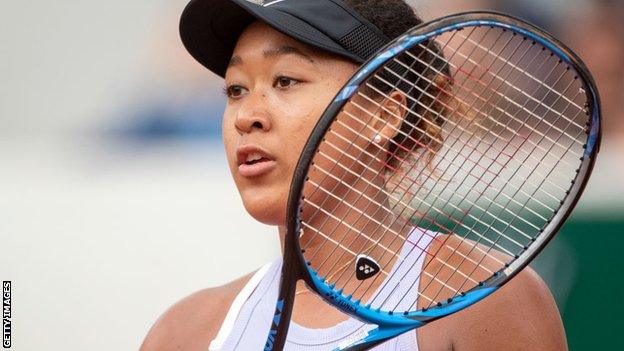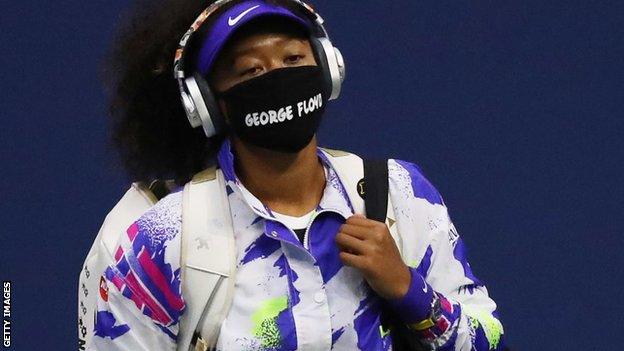Naomi Osaka on French Open, Black Lives Matter & Met Gala
- Published

Four-time Grand Slam champion Naomi Osaka has never been beyond the third round at the French Open
French Open 2021 |
|---|
Venue: Roland Garros, Paris Dates: 30 May-13 June |
Coverage: Selected radio and text commentaries on BBC Radio 5 Live and the BBC Sport website, plus daily reports and analysis |
At the age of 23, Naomi Osaka already has two Australian Open and two US Open titles to her name.
But now comes the really hard bit. Can she win on the clay of Roland Garros, and the grass of Wimbledon, to complete her set of Grand Slam titles?
"Every kid growing up would want to win all four of those," the Japanese player tells BBC Sport in a virtual meeting.
By her own admission, Osaka is still not comfortable on clay. She says she has been scarred by a slip on grass which injured her knee and she has asked five-time Wimbledon champion Novak Djokovic for advice.
In a wide-ranging interview, the world number two talks about her goals, her activism and how despite having never organised a party, she is the now co-chair of this year's glitzy Met Gala in New York.
The challenge of Roland Garros
Osaka has won just one match on clay since she last contested the French Open in May 2019.
That particular clay-court spring was an encouraging one. She reached a semi-final and two quarter-finals before falling in the third round at Roland Garros.
Before arriving in Madrid in late April this year, Osaka said she had not touched clay for two years. And however gifted you may be, it takes time to develop an unfamiliar habit.
Osaka spoke to BBC Sport shortly after losing to the world number 19 Karolina Muchova in the second round of the Madrid Open.
"I realised I was a bit sad because of my loss last week," she said.
"And then I began thinking 'when was the last time I was sad that I have lost a match like this?' And I realised it's been a while.
"I actually do trust myself sliding [on clay]. I think it's just the process of moving after the slide which is a bit difficult."
Days later, Osaka lost to Jessica Pegula in her first match at the Italian Open.
"It just takes time, and you just have to work on it," the American later said of Osaka's prospects on clay.
"Of course I think she can play well. [Russian former world number one Maria] Sharapova wasn't a clay-court player. She won the French twice.
"You see [2011 Roland Garros champion] Li Na - a Chinese player winning the French is crazy to me, too."
If not the clay, how about the grass?
Bad bounces are an occupational hazard on both grass and clay, but winning Wimbledon may present even more of a conundrum.
Osaka's serve will certainly give her a head start, but she did not compete as a junior, and so her grass-court experience is limited to the frenetic few weeks carved out each year by the professional tours.
Regular pre-Wimbledon appearances in Birmingham and Eastbourne will have helped, but Osaka is yet to pass the third round of the main event.
On her last appearance at Wimbledon, as the world number two, Osaka lost to Kazakhstan's Yulia Putintseva in straight sets in the opening round.
"I would say last year [2019] I was definitely very scared, because I actually got injured once on grass because I slipped and I hurt my knee. So it definitely scarred me a little bit," Osaka said.
"It's a bit funny, I talked to [Novak] Djokovic about it, because I wanted to ask him how he moved so well on grass and he said that even though he falls a lot, he keeps getting up and he keeps trying different things.
"So I guess I'll try that the next time I'm on grass."
Off-court activities

Naomi Osaka has become known as much for her activism as her tennis in the past year
With an estimated income of $37.4m (£26.4m), Osaka was the highest-paid female athlete of 2019, according to business magazine Forbes.
She has attracted 2.2m followers on Instagram, and has used her social media presence to voice support for the Black Lives Matter movement.
Each of the seven face masks she wore on to court at last year's US Open highlighted the name of an African-American who had died as a result of alleged police or racist violence in the United States.
But for the most part, when it comes to the Grand Slams, Osaka says she has a one-track mind.
"I would say I definitely switch off everything. My agent knows not to text me about anything unless it's super, super important, and I just like to focus on tennis," she said.
Osaka did, though, attempt to pull out of a tournament in New York last August in protest at the police shooting of Jacob Blake.
And earlier last year she flew with her boyfriend to Minnesota, just a few days after George Floyd had been killed by Derek Chauvin, to "have our voices heard on the streets.", external
She watched the closing stages of the former police officer's trial, as he was found guilty of murder and manslaughter.
"I think it can't be something that's flipped overnight," she said about whether the verdict will lead to lasting change.
"I feel like this is definitely something very monumental, but they say Rome wasn't built in one day, so I would say you can't really expect things to change overnight.
"I think just making people talk about things and being able to understand different people's perspectives and how they think about things is a great start."
Osaka will go to the ball
In New York this September, on the Monday after Osaka hopes to win a third US Open title, she will co-chair the Met Gala - the fashion industry's big night out.
She will share the mostly honorary role with the actor Timothee Chalamet, the singer Billie Eilish and the poet and activist Amanda Gorman.
"I'm not a natural party organiser," she said. "Because I never have thrown a party and I have actually never been to one - no, I have been to one."
She is not yet sure how much say she will have on the guest list for the annual fundraising gala, but singers Beyonce and Rihanna are top of her wish list.
Osaka has had to do a lot of growing up in the public gaze. Naturally shy, she once explained how she tried to "hug the wall" and make herself invisible after spotting Serena Williams in the locker room at the 2017 US Open.
"I wouldn't say it's completely left me now," she said, four years on and having beaten 23-time Grand Slam singles champion Williams in the 2018 US Open final.
"I'm still a fan, but I would say it's more of a respect thing. Just like acknowledging the people who have brought you into this sport and acknowledging all they've done."
And how about the next time she bumps into Beyonce and Rihanna?
"I wouldn't be comfortable, no," she said. "But I hope I wouldn't be awkward this time."

"The UK is all I've ever known": Panorama look into the impact of immigration status on those born or raised in Britain
Wild Weekends: Three youngsters embark on the wildest activities Scotland has to offer
